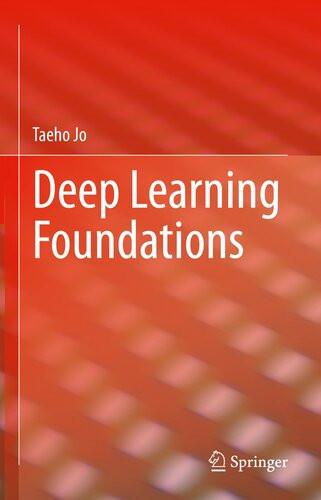Product desciption
Deep Learning Foundations Taeho Jo by Taeho Jo 9783031328794, 3031328795 instant download after payment.
This book provides a conceptual understanding of Deep Learning algorithms. The book consists of the four parts: foundations, deep machine learning, deep neural networks, and textual deep learning. The first part provides traditional supervised learning, traditional unsupervised learning, and ensemble learning, as the preparation for studying deep learning algorithms. The second part deals with modification of existing Machine Learning algorithms into Deep Learning algorithms. The book’s third part deals with deep neural networks, such as Multiple Perceptron, Recurrent Networks, Restricted Boltzmann Machine, and Convolutionary Neural Networks. The last part provides deep learning techniques that are specialized for text mining tasks. The book is relevant for researchers, academics, students, and professionals in Machine Learning. Readers need the basic level of knowledge about linear algebra, vector calculus, and traditional Machine Learning algorithms for understanding the Deep Learning algorithms.
The first part of this book is concerned with the foundation for studying the deep learning algorithms. Because the deep learning is the area, which is expanded from the machine learning, we need to study the machine learning algorithms before doing the deep learning algorithms. There are four machine learning types: supervised learning, unsupervised learning, semi-supervised learning, and reinforcement learning, but we will cover the supervised learning and the unsupervised learning. The ensemble learning is viewed as the learning type where multiple machine learning algorithms are combined for solving their own demerits as the alternative advanced learning to the deep learning. This part is intended to review the supervised learning algorithms, the unsupervised ones, and the ensemble learning, for providing the foundation for understanding the deep learning.
Chapter 1 is concerned with the overview of deep learning. Before discussing the deep learning, let us discuss the swallow learning, which is opposite to the deep learning, and in the swallow learning, the output value is computed directly from the input value. The deep learning is characterized as the process of computing intermediate values between input values and output values, and the input encoding, the output decoding, the convolution, and the unsupervised layer between the input layer and the output layer become the components for implementing the deep learning. There are other advanced learning types than the deep learning: the kernel-based learning, the ensemble learning, and the semi-supervised learning. This chapter is intended to describe the deep learning conceptually for providing the introduction.
Chapter 2 is concerned with the supervised learning as a kind of swallow learning. The supervised learning refers to the leaning type where its parameters are optimized for minimizing the error between the desired output and the computed one.


